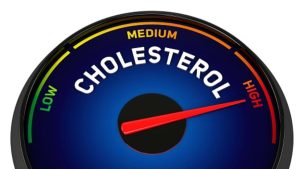
So we all must know by now that when Jackie has the opportunity, a biochemistry lecture will occur. 😉
First, definitions:
triglycerides – this is basically fat in your bloodstream
LDL cholesterol – the “bad” kind
HDL cholesterol – the so-called “good” kind
total cholesterol – the whole mess
As far as I can tell, triglycerides are the worst risk factor for a heart attack. They can be elevated for two reasons: first, insulin resistance can raise them badly as the liver converts excess glucose into fat and sends it off in the bloodstream for the fat cells to absorb, this is not a good thing. But second, they can be elevated when you’re losing weight for the exact opposite reason, because your fat cells are dumping fat for your liver to make ketones out of. (NOTE: this isn’t actually true; your fat cells break down fat first into fatty acids, so don’t increase the triglycerides in your serum. I was just wrong!)
The vast majority of people see their LDL go down on a ketogenic diet. There are some, likely for genetic reasons, in which LDL goes up. I have a difficult time weighing the benefits of keto vs. the downside of elevated LDL myself, so lean on Dr. Peter Attia’s advice, as I admire him greatly (the man has an incredibly sexy brain!) He says for those patients that respond this way, most of whom refuse to give up keto due to the myriad benefits, he recommends cutting back on saturated fat (fatty meats, eggs, dairy) and increasing intake of monounsaturated fat (olive oil and avocado) and omega-3s (fish).
HDL often goes up on keto, but it seems the benefits of higher HDL aren’t as important as we thought 20 years ago; more recent studies seem to indicate it’s not as protective as we surmised. Basically, HDL isn’t a molecule, but a whole pile of them that have different effects, so it’s a confusing story.
Total cholesterol is likely to increase for the exact same reason that triglycerides do, the fat cells dump cholesterol as they shrink.
I’ve already *had* a heart attack, so am not complacent about just thinking my lipid panel will be better when I finish losing weight. Rather, I feel that since I feel so *well*, this would be a very crappy time to have another coronary blockage. I don’t think my arteries can distinguish a bad lipid panel because I’m losing weight vs. because I was diabetic.
So my triglycerides dropped 100 points on ELAB right away, but were still pretty bad, and my LDL was out-of-range as well. Given I’d tried 3 different statins years ago and do not tolerate them (and frankly don’t entirely approve of them for anyone), I spent some time researching other drugs.
When cholesterol is circulating in your body, it gets dumped in bile, which the liver then reabsorbs. A class of drugs called bile acid sequestrants can prevent that reabsorption, so you actually lose cholesterol via stool. These drugs are not absorbed from your GI tract, so can’t have systemic side effects. Because the liver can’t just reabsorb cholesterol when it needs some, it increases it’s LDL receptors and clears more from the blood. That sounded pretty good to me.
I had previously dismissed Zetia as useful as I thought it prevented absorption of cholesterol from food, which it does, but that’s not very useful to someone who only eats 4 times a week. However, it turns out that it also prevents absorption of liver bile salts, so has a mechanism similar to the bile acid sequestrants. That’s much more interesting than I’d known.
The third class of drugs I became interested in were fibrates. They seem to work by removing the cholesterol from the HDL molecule, which then goes back to the arteries to remove more. That seemed to imply that they actually *fix* potential blockages, reversing arteriosclerosis. They don’t improve a lipid panel a whole lot, but significantly reduce actual heart attacks. Though most of the side effects are GI-related, they also have a good list of “side effects,” they reduce retinopathy, amputations, peripheral neuropathy, renal disease, and both GFR and renal outcomes improved in studies. Well, that definitely sounded good to me!
WHEW! Why is all I ever hear about is statins?
I spent several weeks studying this stuff. So I took this info to my cardiologist, along with my interpretation of both my ordinary lipid panels and an advanced lipid panel, and discussed. He had a fourth suggestion, the new drug Vascepa. Vascepa is just very high-dose EPA, the particular omega-3 fatty acid that reduces heart disease.
So I began on a fibrate and Vascepa. My triglycerides went down another 100 points and my LDL went down significantly as well.
I don’t think I’ll need this stuff when I am in maintenance, but the trick is to *get* to maintenance without dying in the meantime.
I also do some supplements for my heart health, but already covered that in the FAQ about supplements, so will end here before everyone is bored to tears. 😉
Spoiler alert! The conversation did not end here! The rest of the conversation with much more information is here: https://www.eatlikeabearden.com/c/frequently-asked-questions/why-did-my-cholesterol-go-up-on-elab
